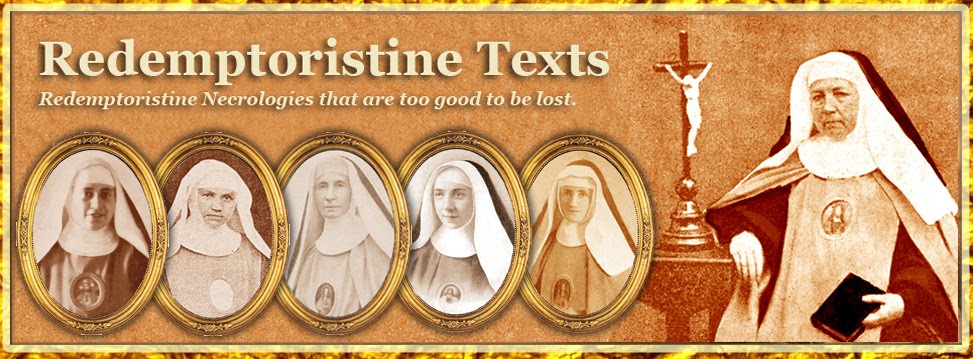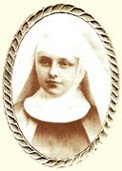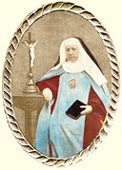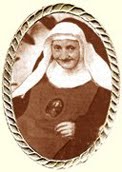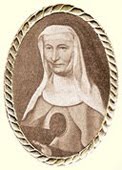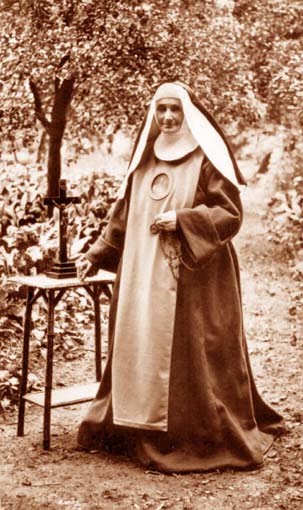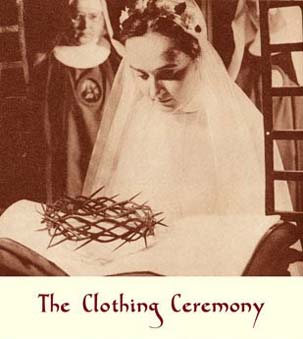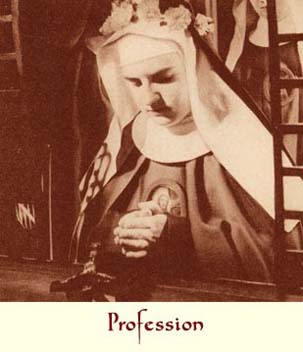Born Marie-Petronille Bruning
Marie Bruning was born in Amsterdam, the capital of Holland, on 5th January 1865. Her father, though he was a good and fervent Catholic, did not really understand the usefulness of the contemplative Orders, and he much preferred the Orders devoted to works of charity. And so Sister Agnes encountered great difficulties in following the attraction which brought her to the Order of the Redemptoristines. However, she managed to enter after the death of her mother, having then attained the age of twenty-three. Because of it, all she received from her family, even after her entry, were some very unpleasant letters. Her brothers and sisters would have no more to do with her, and this heavy cross weighed on her until her death. Mother Marie Agnes bore it courageously through her love of Our Lord, to whom she had sacrificed everything.
The newcomer had a lively, active character, devoted to her work, and her piety was sincere and naïve. After an exemplary Educandate and novitiate, she edified the community by her extreme love for the holy Rule, and by her exactitude in fulfilling all her obligations, even during the last four years of her life, which she spent in her cell or in the infirmary. When she was a novice, she started spitting blood, but she seemed to be cured to such a degree that the Superior felt able to confide the care of the house to her. And then she was first the dispensarian and the Mistress of the Educandes, but in this last task she had a very severe relapse of her former illness, and this forced her, in the fourth year of her communitarian life, to withdraw to the infirmary, where she received the last sacraments on 11th October 1894.
It was feared first of all that consumption would soon put an end to her sufferings. But this was not to be so. Her heavenly Spouse wished to embellish His bride’s crown with a painful illness for four long years. And so we saw her, with such an active nature, condemned to rest. Sister Marie Agnes compensated for this by serving the community through her work in sewing for the linen-room and the sacristy. She made herself even more useful to it by the perfect example of her perfect resignation to the will of God and by the practice of all the other virtues. In summer in her cell and in winter in the infirmary, trying sometimes to join with the others in the refectory, in the garden or in choir, she clung especially to faithfully reciting the Divine Office, in spite of the enormous pain her coughing caused her. The little choir in the infirmary was her abode of predilection, and she spent entire Sundays there, close to the sacred Tabernacle, living in continuous prayer and a generous effort to refuse nothing to God. Her cheerfulness, and the tranquil resignation with which she bore her heavy cross, without the most severe attacks being able to alter her patience or draw from her any complaint, greatly edified all those who visited her. And everyone was happy to go and see her. As for her, she was equally content with the visits or absences of the Superior or her nurses, when they were called away sometimes by other occupations. Her unalterable cheerfulness even struck the doctor with astonishment, and more than once he could not restrain himself from expressing his admiration. To the questions he asked this Sister, she would invariably reply: “I’m all right, doctor”, as if she had had nothing to suffer.
A remarkable thing! Her illness did not in the least diminish her exactitude in observing the holy Rule. In the spirit of poverty, she deprived herself of light at supper and on going to bed. For her work she utilised the smallest bits of cotton. She was always content with what was given to her and never ceased to witness her gratitude for the least services. In the last days of her life, burdened as she was by violent oppressions of the chest, she expressed only one fear, that of losing her patience. “My Jesus”, she exclaimed, “give me perseverance. Mother of Sorrows, help me”. And she was heard. Her patience never gave way, not even on that last night, which was the most painful of all of them for her. At about four o’clock in the morning, her powers began to diminish. After the Holy Mass, the prayer of the dying was recited before her, to which she replied. She then spent a few more moments with the confessor, and at eight o’clock she gave her beautiful soul up to God, on 22nd October 1898. She was thirty three years of age and had spent ten of them in religion.
The Sisters began to invoke her, especially to obtain spiritual favours, and her memory is always venerated in the Monastery. “It was a great sorrow for us”, the Chronicle records, “to lose our little Saint; but we adore the inscrutable decrees of God. In eternity we shall see why He took a Sister from us in the prime of her life when she could have been a pillar of our community. And now she is our advocate with God, she who, before dying, said that she was offering her life for our Monastery. May the divine Redeemer accept her sacrifice and hear her prayers!”
The newcomer had a lively, active character, devoted to her work, and her piety was sincere and naïve. After an exemplary Educandate and novitiate, she edified the community by her extreme love for the holy Rule, and by her exactitude in fulfilling all her obligations, even during the last four years of her life, which she spent in her cell or in the infirmary. When she was a novice, she started spitting blood, but she seemed to be cured to such a degree that the Superior felt able to confide the care of the house to her. And then she was first the dispensarian and the Mistress of the Educandes, but in this last task she had a very severe relapse of her former illness, and this forced her, in the fourth year of her communitarian life, to withdraw to the infirmary, where she received the last sacraments on 11th October 1894.
It was feared first of all that consumption would soon put an end to her sufferings. But this was not to be so. Her heavenly Spouse wished to embellish His bride’s crown with a painful illness for four long years. And so we saw her, with such an active nature, condemned to rest. Sister Marie Agnes compensated for this by serving the community through her work in sewing for the linen-room and the sacristy. She made herself even more useful to it by the perfect example of her perfect resignation to the will of God and by the practice of all the other virtues. In summer in her cell and in winter in the infirmary, trying sometimes to join with the others in the refectory, in the garden or in choir, she clung especially to faithfully reciting the Divine Office, in spite of the enormous pain her coughing caused her. The little choir in the infirmary was her abode of predilection, and she spent entire Sundays there, close to the sacred Tabernacle, living in continuous prayer and a generous effort to refuse nothing to God. Her cheerfulness, and the tranquil resignation with which she bore her heavy cross, without the most severe attacks being able to alter her patience or draw from her any complaint, greatly edified all those who visited her. And everyone was happy to go and see her. As for her, she was equally content with the visits or absences of the Superior or her nurses, when they were called away sometimes by other occupations. Her unalterable cheerfulness even struck the doctor with astonishment, and more than once he could not restrain himself from expressing his admiration. To the questions he asked this Sister, she would invariably reply: “I’m all right, doctor”, as if she had had nothing to suffer.
A remarkable thing! Her illness did not in the least diminish her exactitude in observing the holy Rule. In the spirit of poverty, she deprived herself of light at supper and on going to bed. For her work she utilised the smallest bits of cotton. She was always content with what was given to her and never ceased to witness her gratitude for the least services. In the last days of her life, burdened as she was by violent oppressions of the chest, she expressed only one fear, that of losing her patience. “My Jesus”, she exclaimed, “give me perseverance. Mother of Sorrows, help me”. And she was heard. Her patience never gave way, not even on that last night, which was the most painful of all of them for her. At about four o’clock in the morning, her powers began to diminish. After the Holy Mass, the prayer of the dying was recited before her, to which she replied. She then spent a few more moments with the confessor, and at eight o’clock she gave her beautiful soul up to God, on 22nd October 1898. She was thirty three years of age and had spent ten of them in religion.
The Sisters began to invoke her, especially to obtain spiritual favours, and her memory is always venerated in the Monastery. “It was a great sorrow for us”, the Chronicle records, “to lose our little Saint; but we adore the inscrutable decrees of God. In eternity we shall see why He took a Sister from us in the prime of her life when she could have been a pillar of our community. And now she is our advocate with God, she who, before dying, said that she was offering her life for our Monastery. May the divine Redeemer accept her sacrifice and hear her prayers!”
This necrology is translated from Fleurs de l'Institut des Rédemptoristines by Mr John R. Bradbury. The copyright of this translation is the property of the Redemptoristine Nuns of Maitland, Australia. The integral version of the translated book will be posted here as the necrologies appear.
